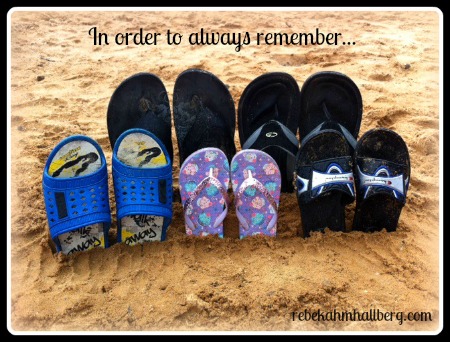I’m realizing more and more each day, that my children are growing up. This summer, especially, we’re realizing that all of our parenting efforts are leading to times like this - where we’re preparing to let them go. While that is a good and right goal, it hit me recently that I need to be okay with opportunities to let them go, and let them begin to spread their wings while still in the safety of our family.

I’ve been thinking a lot about all of this as a week of church camp for each of our boys has been on the calendar. Our older son went away last year, called us once or twice, and I was nervous the whole time. This year, as he prepared to go again, we had a lot of good conversations about the right things to do, the way to behave, interaction with friends and leaders, and I realized that he loves this opportunity for time away, to learn and grow. And so I’m not worrying too much that he isn’t calling home this week. I know he’s having a great time!
 But then, there’s this guy - see that face? I know - I can hardly see it either. We have spent the 9 years since he was born, trying to help him in one way or another. From early feeding issues, to a then-unknown speech and language problem, to wondering if he could actually hear or not, to countless nights where he couldn’t (or sometimes, wouldn’t) sleep - we have been there.
But then, there’s this guy - see that face? I know - I can hardly see it either. We have spent the 9 years since he was born, trying to help him in one way or another. From early feeding issues, to a then-unknown speech and language problem, to wondering if he could actually hear or not, to countless nights where he couldn’t (or sometimes, wouldn’t) sleep - we have been there.
We’ve chased him into and out of water, we’ve taken unsafe things out of his hands and put safe things into his hands. We’ve followed him up and down mountains. We’ve cleaned up Sharpie off the walls, and then went and hid all those markers. Until we gave them back and let him create masterpieces in appropriate ways. We’ve been through meltdowns and put life on hold. We’ve gone from being loved one minute, to extremely disliked in the next. We’ve tweaked all areas of life in an effort to make sure he was safe and could function within it. We’ve endured sleepless nights, sleepless days, and then pushed repeat on that cycle for days on end. We’ve visited places before appointments, in order to make sure he knew he’d be safe there. We’ve practiced what to do, when to do it, and how to be sure we could cope. We’ve gently corralled the occasional sleep-walker. We’ve arrived late, left early, changed plans at the last minute when he couldn’t cope, and endured the stress of all of that. We’ve lost friends, gained love and support from places we didn’t even know to look, and watched in awe as things finally started to come together.
In all of this, I’ve had a lot to do - chasing, corralling, feeding, not sleeping, sleeping, holding, hiding, providing, nurturing, waiting, gently pushing, searching, re-thinking, planning, preparing. Next week he goes away for 5 days and 4 nights. Without us.
All of his life - everything that we’ve done - has been in preparation to let him go.
While Tim and I were talking about it the other night, I spent a few minutes with my fears:
*What if he isn’t understood?
*I’m really sending him away to a place he’s never been?
*What if he doesn’t eat enough?
*What if he doesn’t sleep enough?
*What if he has a massive meltdown?
*What if he is wildly successful? (Yes, I even thought about that, too.)
*Will they take good enough care of him?
*Will he remember anything we’ve tried to teach him? (Be kind, use your words, brush your teeth.)
But then there was the big one - and I didn’t even realize it was in there.
While we’re preparing to let them go,
I have to be okay with it when they do go.
What am I going to do while he’s gone? For his 9 years, my daily existence has been wrapped up in keeping him safe, in making sure he’s understood and that he can cope in his surroundings.
 This also makes me incredibly thankful that our other two kids understand their brother, and his needs, so well. They are such a support to him and they understand, to some extent, the amount of time and effort required to help him make it through a day. They are his best advocates and champions! God really put together an amazing group of siblings with these three!
This also makes me incredibly thankful that our other two kids understand their brother, and his needs, so well. They are such a support to him and they understand, to some extent, the amount of time and effort required to help him make it through a day. They are his best advocates and champions! God really put together an amazing group of siblings with these three!
Maybe you wonder why I’m letting him go, if all of life has been like this? That’s a very fair question, because I’ve thought about that, too. We could just keep him home, plan other fun activities to “take the place” of camp. But here’s why we’re letting him go - and why I’m trying to be okay with that:
*Most of the way we’ve raised him has been framed with, “for when you can do this on your own someday.”
*He will only be 1 hour away from home.
*He really wants to go & a lot of his friends will be there (and no, not all of his friends know of his issues, but he is comfortable with them).
*The leaders who are going really try to know and understand who he is, how he functions, and how they can best support him.
*I talked with someone at the camp who listened to my concerns and answered in ways that let me know he will be well cared for.
*He heard there will be archery there and really wants to try it out (and for the perfectionist that he is, that could be a great option for an activity!)
*But really - because I have to start somewhere with letting him spread his wings.
 And so I started to gather his clothes for camp yesterday. We talked about outfits, getting his clothes back into the bag at the end of the day, how to decide what to wear on his feet, to put on a sweatshirt if he was chilly, that all his clothes and items will be labeled.
And so I started to gather his clothes for camp yesterday. We talked about outfits, getting his clothes back into the bag at the end of the day, how to decide what to wear on his feet, to put on a sweatshirt if he was chilly, that all his clothes and items will be labeled.
And I will pack his things later this week, and I will probably write him notes and tuck them into his Bible, and in his pillow, and inside his sneakers. And God and I will spend a lot of time together as I wait on Him through the week, because I’m preparing to let them go - and I have to be okay with it when they do go!
Sharing this post at -
rachelwojo.com









